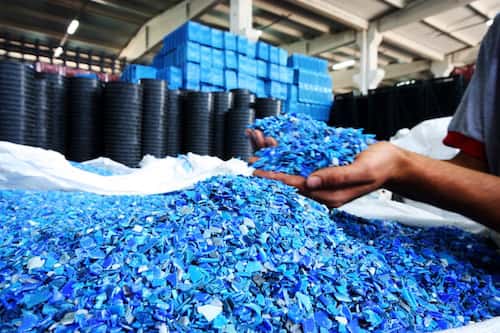Plastics
The packing material of our time
Today, plastics are used practically everywhere. They can be produced at low cost and their universal formability means that they adapt to each use optimally. As plastics do not biodegrade, recycling them is very important for environmental protection and the conservation of resources. Increases in the raw oil price have made the reuse of plastics as secondary raw materials consistently more lucrative.
Proportion of plastic types in the processing volume
Plastics 2019
Source: Umweltbundesamt
Strict separation for better reuse
Virtually all shredding processes for appliances yield a mixture of different parts. Ferrous and non-ferrous metals are removed for further treatment and the plastic materials are separated according to type. These different materials must be separated as neatly as possible in view of their reuse. Applying pressure and heat, the particles are transformed into plastic granules as the intended intermediate product. These granules are melted together with added new granules and pressed into shape.
High-quality techniques are used for processing plastics
The technique to be used in the recycling, reuse, and regranulation depends largely on the starting material. As a rule, purer plastics can be recycled quite well and as secondary raw materials, they are much sought after. A model case is the recovery of plastics from discarded electric appliances and many other areas. Here, recycling is significantly more complex than in other areas, because many different plastics are incorporated in these devices. Durch den Einsatz modernster, sensorgestützter Sortiertechnologien können sortenreine Kunststoffe als Sekundärrohstoffe wiedergewonnen werden. Diese sortenreinen Kunststoffe können wieder eingeschmolzen und zu neuen Produkten weiterverarbeitet werden. The goal must be to apply high-quality processing techniques, such as bottle-to-bottle recycling. PET bottles are sorted specifically according to their colour, cleaned and used to produce new PET bottles.
Origin of recycled plastics
Source: Elektro Ade
Economical recycling of PET
The single-origin reuse is the prerequisite for making new PET bottles from PET flakes – and all that in food quality. The patented URRC (United Resource Recovery Corporation) process ensures that high standards are applied and that over 98% purity is achieved, as required for reuse. With highly advanced sorting processes, which are based on laser spectroscopy and work at high speed, the flakes are sorted according to colour and processed into granulate. New material is added to the granulate from recycling. Strong efforts are being made to produce bottles purely from recycled material.
Recycling process for polystyrene
Shredded polystyrene waste is transformed to polystyrene regranulate. EPS waste is normally ground and freed from dust and subsequently used as EPS granulate for filling and for recycling boards.